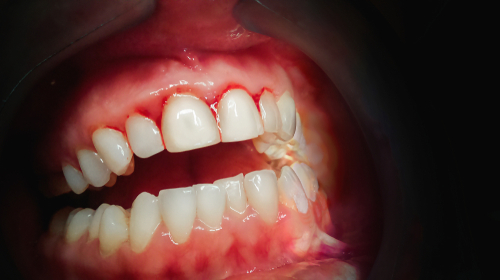 The most troublesome part of periodontal disease is that most people aren’t even aware that they have it. Much of this could be that many people don’t even really know what periodontal disease is. The Centers for Disease Control (CDC) has reported that one in every two Americans over the age of 30 have some form of periodontal disease.
The most troublesome part of periodontal disease is that most people aren’t even aware that they have it. Much of this could be that many people don’t even really know what periodontal disease is. The Centers for Disease Control (CDC) has reported that one in every two Americans over the age of 30 have some form of periodontal disease.
At Riverside Dental Care, our dentists and hygienists are routinely evaluating the health of your gum tissue. Yearly, we are checking the pocket depths around your teeth to make sure your gums are healthy. We also monitor bone levels on your dental x-rays and monitor the appearance of your gum tissue closely.
What Exactly Is Periodontal Disease?
We believe that knowledge is power when it comes to getting the most out of your mouth. Our dental team wants to bring awareness to periodontal disease and educate our patients on what they can be doing to best protect and care for their gum tissue.
Periodontal disease is an inflammatory disease involving the supporting structures of your teeth. It is caused by certain bacteria that are present in your mouth. When your immune system tries to attack and eliminate this bacteria, it also causes destruction to the supporting structures of your teeth.
Symptoms associated with gum disease may include:
- Red, swollen gums
- Bleeding gums
- Loose teeth
- Recession
- Bad Breath
- Deep pockets (spaces between gum tissue and teeth)
Treatments For Gum Disease
Treatments for gum disease vary as to how advanced your disease is. Early gum disease begins when the inflammation in your gum tissue progresses to affect the supporting structures around your teeth. The pocketing between your gum tissue and your tooth usually deepens to 4+mm and the bone surrounding your teeth might be slightly affected.
Treatment for early gum disease usually involves scaling and root planing where the bacteria and tartar buildup is removed from above and below your gum line. Removing the bacteria and tartar buildup from these areas allows your tissue to heal and usually, the pocket depth shrinks back down.
Moderate gum disease involves deeper pocketing and more bone loss. With this type of gum disease, scaling and root planing also are typically a part of treatment. Other procedures may also be included such as laser or antibiotic therapy.
If you don’t respond to scaling and root planing as well as hoped or if you have severe periodontal disease it is possible that more involved treatment may be needed. Flap surgery, gum grafts, and bone grafting may be a necessary treatment for some more involved periodontal cases.
What To Expect After Treatment?
Following any periodontal diagnosis, your gum tissue will be closely monitored by our dental team. Monitoring pocket depths and bleeding points is very important as this tells if your disease is stable or if things are progressing.
It is likely that you will have periodontal maintenance appointments at more frequent intervals to help keep bacteria under control and allow for better healing. Periodontal maintenance appointments commonly happen at 3, 4, or 6-month intervals depending on what your dental needs are.
Periodontal maintenance appointments will involve assessments of your gum tissue, reviewing homecare techniques, and also cleaning your teeth above and below your gum line.
Things That Can Affect The Progress Of Periodontal Disease
There are many factors that affect periodontal disease and how quickly it progresses:
- Smoking – Smoking increases your risk of periodontal disease and it also speeds up the disease progress by reducing your tissues from getting oxygen they need.
- Homecare – Good home care reduces your risk of developing periodontal disease and also slows the disease.
- Genetics – Periodontal disease has many environmental factors but it also has a genetic component. Having parents and grandparents with periodontal disease can increase your chances of developing periodontal disease as well.
Whether you have been diagnosed with periodontal disease or not, we have found that routine dental appointments are very important for diagnosis, maintenance, and treatment of disease. Have you seen your dentist in the last 6 months?



Leave a Reply